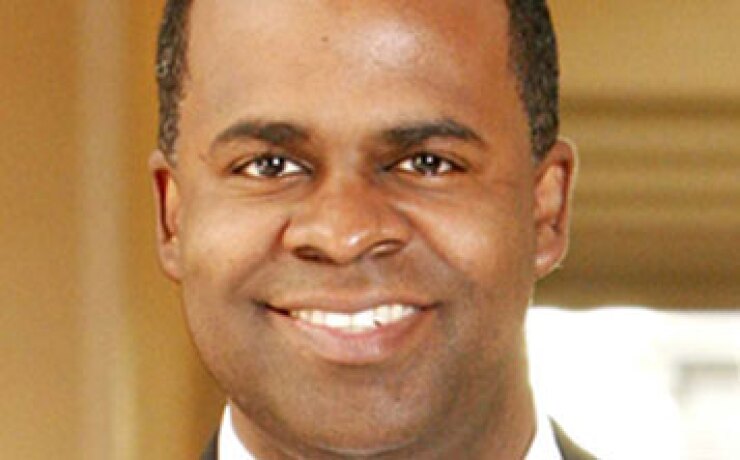
BRADENTON, Fla. — A myriad of options, including the use of pension bonds, are being considered in Atlanta, where spending on retirement benefits has soared to 20% of the city’s $523 million annual operating budget and the unfunded liability is now $1.5 billion.
In addition to pension obligations that are only 53% funded, the city is grappling with other post-employment benefits for which the unfunded liability currently is estimated at $1.1 billion.
How daunting will it be to resolve these pension and OPEB issues, which contributed to a downgrade of Atlanta’s general obligation rating last year?
“It’s so bad that one of the silver linings is it’s impossible for any of the stakeholders to claim that the present course is sustainable,” City Council member Howard Shook said yesterday.
Shook, who was reelected to his third term on the council last year, serves on a 14-member Pension Review Panel appointed by newly elected Mayor Kasim Reed.
The panel, whose members include top area executives and union representatives in addition to city officials, on Monday
The solutions include eliminating retroactive provisions granted in the last decade, providing discounted lump-sum payouts of pension benefits, and issuing bonds to pay off the unfunded liability.
“The stark reality is that one out of every five tax dollars from Atlanta’s general fund is currently going to pay for a pension system which is increasingly unsustainable,” Reed said in a statement. “We need to face this challenge head on, being mindful of the responsibility to taxpayers who fund that pension system without breaking faith with the public servants who have dedicated their lives to the city.”
Shook, who headed up the city’s finance committee for four years, said he also chaired a City Council pension committee last fall that “arrived at virtually the identical solutions” being considered by the review panel today.
But he said bonding is an option and some union representatives “seemed to find that attractive” along with other suggestions such as raising taxes to maintain benefits.
“What was pointed out to us is that now is a fairly good time to borrow money,” Shook said.
That point was underscored yesterday in a report by Bank of America Merrill Lynch Global Research, which said the popularity of taxable Build America Bonds has given rise to better investor understanding of the taxable market for municipal debt.
Given the increased receptivity in the taxable market, “we may expect some more [pension obligation bond] issuance,” the research report said.
“BABs have been narrowing the spread since they came out, and somewhat more recently because more buyers are looking at them and evaluating them,” said John Hallacy, managing director and head of municipal research at B of A Merrill.
“The pension obligation bonds are definitely analogous to what’s gone on with BABs because there’s a whole discovery period and as people buy, sell, and trade them, the more spreads narrow and they continue to be a better deal for the issuer.”
While Shook acknowledged that bonding is one option to dealing with a portion of Atlanta’s pension obligations, he also noted the city has considerable outstanding debt and is currently working on plans to sell $1.4 billion of new-money and refunding bonds, with most of the proceeds going toward completion of the new international terminal at Hartsfield-Jackson International Airport.
The city is also struggling with budget deficits and the effects of the recession which, in addition to the rising pension and OPEB costs, led to downgrades of its GO rating in March.
Moody’s Investors Service downgraded Atlanta to A1 from Aa3, Standard & Poor’s dropped it to A from AA-minus. Fitch Ratings no longer rates the city’s GOs.
Standard & Poor’s assigned a stable outlook to Atlanta’s GOs. Moody’s assigned a negative outlook.
“The negative outlook reflects Moody’s belief that the city will be challenged to stabilize and strengthen the financial position of the general fund during the near term, despite the adoption of financial reform initiatives in October 2008 and the implementation of austere budget reductions during fiscal 2009 to date,” according to the rating report by analyst Alicia Stephens.
Moody’s said the city’s primary operating revenue, pressured by the current recession and tax appeals, continue to slide below budgeted levels, and fixed pension costs continue to escalate as a result of recent benefit enhancements and fund asset declines.
“The city has not maintained local revenues in step with budgetary growth and the ability of the city to effectively address sustained revenue declines beyond fiscal 2009 remains uncertain,” Stephens wrote.
To avoid further downgrades, at least from pension obligation pressures, Shook said the city must work on reform.
“We’re going to have to stem the bleeding,” Shook said, “and we’ll begin with the initial steps in upcoming meetings to affect the fiscal year 2011 budget, which we will get in about a month.”
Shook projected Atlanta would spend a year with all of the pension stakeholders and “come up with a long-term plan that is fair and affordable.”
In addition to pension and OPEB problems, Atlanta also is looking to the Georgia legislature to help it get authorization for a municipal option sales tax the city could use to fund growing public safety and infrastructure needs.
Experts have said the current backlog of needs is estimated at $750 million, but improvements to Atlanta’s public infrastructure over the next 25 years are estimated to cost $3.1 billion.
The City Council earlier this month asked state lawmakers to approve a bill that would give local voters the opportunity to fund those infrastructure needs with a sales tax increase. The General Assembly is in session through late March.





